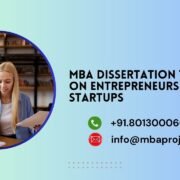How to Conduct a Competitive Analysis in an MBA Dissertation
How to Conduct a Competitive Analysis in an MBA Dissertation
Introduction
How to Conduct a Competitive Analysis in an MBA Dissertation. A well-structured competitive analysis is an essential component of an MBA dissertation, providing deep insights into market positioning, competitor strategies, and industry trends. Conducting a thorough competitive analysis allows business students to identify key success factors, competitive advantages, and gaps in the market. This article will guide MBA students through the best practices for executing a rigorous and detailed competitive analysis that strengthens their dissertation.
Understanding Competitive Analysis in an MBA Dissertation
A competitive analysis in an MBA dissertation involves assessing direct and indirect competitors within an industry. This process includes analyzing competitors’ market positioning, financial performance, product offerings, marketing strategies, and customer perception. The objective is to identify competitive gaps and formulate strategic recommendations.
Key Steps to Conduct a Competitive Analysis
1. Define the Research Scope and Objectives
Before diving into competitor data, it is essential to clearly outline:
- The industry and market segment under study.
- The purpose of the competitive analysis (e.g., understanding market gaps, benchmarking best practices, identifying threats).
- The competitors to be analyzed.
2. Identify Direct and Indirect Competitors
Competitors can be categorized as:
- Direct competitors: Businesses offering similar products or services targeting the same audience.
- Indirect competitors: Companies providing alternative solutions that fulfill the same customer needs.
Methods to Identify Competitors:
- Market research reports (Gartner, Statista, IBISWorld).
- Company websites and annual reports.
- Industry publications and trade journals.
- Customer reviews and feedback on platforms like Trustpilot and Glassdoor.
- Social media analytics and competitor engagement metrics.
3. Analyze Competitor Strategies
A. SWOT Analysis
A SWOT analysis provides a structured approach to evaluating competitors’ Strengths, Weaknesses, Opportunities, and Threats.
- Strengths: Identify what makes the competitor successful (e.g., strong brand, innovative products, loyal customer base).
- Weaknesses: Look for gaps in their strategies (e.g., poor customer service, high pricing, weak online presence).
- Opportunities: Consider market trends that could benefit the competitor (e.g., expansion into emerging markets, digital transformation).
- Threats: Evaluate potential risks (e.g., economic downturns, new regulations, emerging competitors).
B. Porter’s Five Forces Model
This framework helps assess industry competitiveness by analyzing:
- Threat of new entrants: Barriers preventing new competitors from entering the market.
- Bargaining power of suppliers: Influence suppliers have over pricing and supply chain.
- Bargaining power of buyers: Customers’ ability to demand better prices and services.
- Threat of substitute products: Risk posed by alternative solutions available to consumers.
- Industry rivalry: Competitive intensity among existing players.
4. Financial Performance and Market Share Analysis
A quantitative assessment of competitors’ financial health provides insight into their sustainability and market influence. Key financial indicators include:
- Revenue growth and profitability margins.
- Market share and revenue trends.
- Operational efficiency (cost structures, economies of scale).
- Investment in R&D and technological advancements.
- Funding sources and financial backing.
Sources for Financial Data:
- Annual reports and SEC filings.
- Financial databases (Bloomberg, Yahoo Finance, Reuters).
- Investor presentations and earnings call transcripts.
5. Product and Service Differentiation
Assess competitors’ product offerings in terms of:
- Quality and features.
- Pricing strategies.
- Customer value propositions.
- Innovation and technological advancements.
- Supply chain and logistics efficiency.
By benchmarking these aspects, students can uncover gaps and opportunities for strategic recommendations in their dissertation.
6. Marketing and Branding Strategies
Competitor marketing strategies provide insights into customer engagement, brand positioning, and promotional tactics.
Key areas to evaluate:
- Digital marketing presence: Website SEO, social media engagement, content marketing effectiveness.
- Advertising campaigns: Traditional vs. digital advertising approaches.
- Customer loyalty programs and retention strategies.
- Brand reputation and perception.
- Influencer partnerships and sponsorships.
Tools for Marketing Analysis:
- Google Trends and SEO tools (SEMrush, Ahrefs, Moz).
- Social media analytics (Facebook Insights, LinkedIn Analytics, Twitter Analytics).
- Customer review platforms (Trustpilot, G2, Capterra).
7. Consumer Sentiment and Competitive Positioning
A detailed understanding of consumer perception helps determine how competitors are perceived in the marketplace. Techniques to analyze customer sentiment include:
- Survey and feedback analysis.
- Social listening tools (Hootsuite, Brandwatch).
- Online review mining and sentiment analysis.
- Focus groups and consumer research reports.
8. Emerging Trends and Future Competitive Landscape
Staying ahead requires understanding industry trends and their potential impact on competition. Important factors to consider:
- Technological advancements and digital transformation.
- Changing consumer behavior and preferences.
- Regulatory and policy changes.
- Sustainability and corporate social responsibility (CSR) trends.
- Global market expansions and M&A activities.
9. Strategic Recommendations and Conclusion
After gathering and analyzing all relevant data, the final step is to synthesize findings into actionable strategic recommendations.
Key Strategic Recommendations:
- Identify market gaps for new opportunities.
- Enhance value propositions based on competitive weaknesses.
- Develop pricing and positioning strategies for better market penetration.
- Leverage technology to gain a competitive advantage.
- Improve customer engagement through digital channels.
Final Thoughts
A well-researched competitive analysis in an MBA dissertation not only enhances academic rigor but also equips students with real-world insights into industry dynamics. By following a structured approach to competitor assessment, MBA students can craft a dissertation that stands out with practical, data-driven conclusions.
Thank you for reading our Blog “How to Conduct a Competitive Analysis in an MBA Dissertation”.
Also, read our more BLOG here.
For Order “MBA Projects” feel free to contact us at Mob: Call / WhatsApp: +91.8013000664 || Email: info@mbaprojects.net.in












